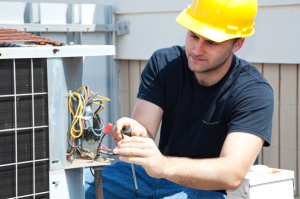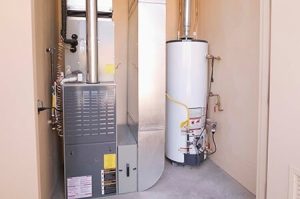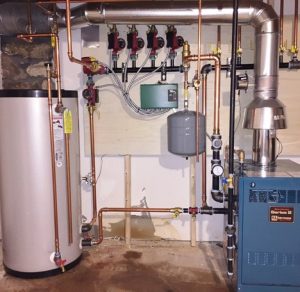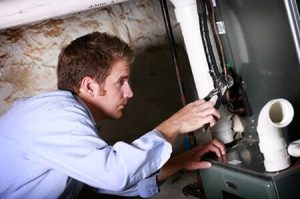Air Temperature Control Systems, Inc.
Emergency Furnace Repair Near Ypsilanti MI
Get Warm this Winter with the Leading Ypsilanti Furnace Repair Company!

Need Heating system repairs in Ypsilanti Michigan? Get Air Conditioning service and Furnace Repair in Ypsilanti MI, 48197, 48198 For dependable heat pump repair services in Southeast Michigan, or Heating System Furnace Repair in Ypsilanti: Call 734-697-8288. We do all Cooling Systems. Licensed HVAC Technician. Expert Repair. 25 yr Experience.
“Serving Belleville, MI and the Surrounding Areas.”
A furnace (known as a heater or boiler in British English) is an appliance used to generate heat for all or part of a building. It primarily serves as a key component of central heating systems in Ypsilanti, & Canton, Michigan, 48187, 48188. These furnaces are permanently installed to provide warmth to indoor spaces via intermediary fluid movement, which can be air, steam, or hot water. Heating appliances using steam or hot water are typically called residential steam boilers or residential hot water boilers. Our technicians are thoroughly background-checked, prioritizing your safety and peace of mind. As a Premier hvac Dealer, we guarantee top-tier service, meeting the highest standards in the industry.
CALL NOW! (734) 697-8288
Comfort Shouldn’t Cost a Fortune!
Get fast, affordable service with a
FLAT FEE GUARANTEE
Natural gas is the most common fuel source In North America and much of Europe, for modern furnaces, though other sources like liquefied petroleum gas (LPG), fuel oil, wood, and, in rare cases, coal, are also used. Additionally, electrical resistance heating is employed in some regions, particularly where electricity costs are low or the primary heating method is air conditioning.
Modern high-efficiency furnaces can achieve up to 98% efficiency and can operate without a chimney. Conversely, typical gas furnaces maintain about 80% efficiency. Waste gas and excess heat are expelled using mechanical ventilation systems, utilizing either metal flue pipes or polyvinyl chloride (PVC) pipes that vent through the building’s side or roof. The fuel efficiency of gas furnaces is measured by the Annual Fuel Utilization Efficiency (AFUE).
Air Conditioning and Furnace Repair in Ypsilanti: Our winters in in Ypsilanti, & Canton, Michigan, 48187, 48188 can be long and bitterly cold, often seeming like they’ll never end. During these harsh months, your furnace is pushed to its limits, and breakdowns are common. A malfunctioning furnace can lead to severe discomfort, health risks, and even frozen pipes. With over 35 years of HVAC expertise, our highly trained and fully licensed technicians provide top-notch service to ensure your home stays warm and safe. Whether it’s a furnace, heat pump, or another heating system, in Ypsilanti, & Canton, Michigan, 48187, 48188 we have the experience to repair all makes and models.
Why Choose Us for Your Furnace Repair?
Highly Skilled Technicians:Our team is fully licensed, insured, and focused on your comfort.
Reliable Service:Enjoy prompt and reliable repairs to get your heating system back up and running quickly.
Transparent Pricing:We offer flat-rate services with no hidden charges or hourly rates—quality service at an affordable price.
Don’t let a furnace failure ruin your winter. Contact us today for emergency repairs and restore your peace of mind with Air Temperature Control, Inc.
Residential Furnace Repair & Replacement & Installation in Ypsilanti MI: FAQ

Common Furnace Problems and Solutions
- Furnace Won’t Turn On: This could be due to a tripped circuit breaker, a faulty thermostat, or a pilot light issue.
- Furnace Makes Strange Noises: Unusual sounds might indicate a problem with the blower motor, fan belt, or heat exchanger.
- Furnace Isn’t Heating Properly: Insufficient heat could be caused by a clogged filter, a malfunctioning thermostat, or a problem with the heat exchanger.
- High Energy Bills: Inefficient operation, ductwork issues, or a worn-out furnace can lead to increased energy consumption.
When to Repair or Replace Your Furnace
- Age of Furnace: Furnaces typically last 15-20 years. If yours is nearing this age, replacement might be more cost-effective.
- Frequency of Repairs: Frequent repairs can signal the end of a furnace’s lifespan.
- Energy Efficiency: Older furnaces in Ypsilanti are less efficient, leading to higher energy bills.
- Comfort Issues: Inconsistent heating or inadequate warmth can be a sign of replacement.
Furnace Installation Tips
- Size Matters: Ensure the furnace is properly sized for your home to avoid inefficiencies.
- Ductwork Inspection: Check the condition of your ductwork for leaks or blockages.
- Professional Installation: Hire a licensed and experienced technician for proper installation.
- Maintenance: Schedule regular maintenance to optimize performance and longevity.
Furnace Maintenance Tips
- Change Air Filters Regularly: Dirty filters restrict airflow and reduce efficiency.
- Inspect Vents and Registers: Ensure they’re clear of obstructions.
- Annual Tune-Up: Professional maintenance can identify potential issues before they become problems.
Choosing the Right Furnace
- Energy Efficiency: Consider the AFUE rating (Annual Fuel Utilization Efficiency) to measure efficiency.
- Fuel Type: Choose between gas, electric, or oil based on availability and personal preference.
- Size: Select a furnace that matches your home’s heating needs.
- Budget: Determine your budget for both the furnace and installation.
Emergency Furnace Repair
Many HVAC companies in Ypsilanti, & Canton, Michigan, 48187, 48188 offer 24/7 emergency services. Be prepared with contact information for a reliable HVAC technician in case of a furnace breakdown.
Natural Draft Furnaces

Early Design and Construction
Natural draft, atmospheric burner furnaces were among the earliest types of heating systems developed. These furnaces featured heat exchangers made from cast iron or riveted steel, housed within an outer shell composed of brick, masonry, or steel. The heat exchangers were vented through brick or masonry chimneys, facilitating the expulsion of combustion gases.
Air Circulation
Air circulation in these systems was achieved through the use of large pipes, constructed either from wood or metal, that directed warm air into floor or wall vents within the home. This natural draft mechanism capitalized on the principle that warm air rises, allowing heat to disperse throughout the living space.
Operation and Fuel Adaptability
The simplicity of these furnaces is notable; they had minimal controls, typically just a single automatic gas valve, and lacked blowers. This basic design allowed for the use of various fuels, as the burner area could be adapted accordingly. Historical records indicate that these furnaces operated with a diverse range of fuels, including wood, coke, coal, trash, paper, natural gas, fuel oil, and even whale oil for a brief period in the early 20th century.
Maintenance and Modern Adaptations
Solid fuel-fired furnaces necessitated daily maintenance to remove ash and “clinkers” from the burner area. Over time, as technology advanced, many of these furnaces were retrofitted with electric blowers. This innovation improved air distribution and expedited the heating process.
Controls
In their original designs, gas and oil-fired systems were typically managed by a thermostat within the home. In contrast, wood and coal-fired furnaces lacked electrical connections. Their operation was regulated manually by adjusting the fuel quantity in the burner and manipulating the fresh-air damper on the burner’s access door.
Overall, the transition from manual to semi-automated control mechanisms and the integration of electric blowers marked significant technological advancements in the functionality and efficiency of natural draft furnaces.
For air conditioner installations, maintenance, or emergency repairs, contact Belleville MI’s top-rated heating and cooling technicians at Air Temperature Control today! We service Romulus, Ypsilanti, Canton, Ann Arbor, New Boston and the surrounding areas.
Forced-Air Furnaces: A Closer Look
Forced-air furnaces represent a significant advancement over natural draft systems. These units employ an atmospheric burner and a cast-iron or sectional steel heat exchanger to generate warmth. Despite their limitations, forced-air furnaces laid the groundwork for the development of more efficient heating systems, such as forced draft and condensing furnaces.
How Forced-Air Furnaces Work
Unlike their predecessors, forced-air furnaces utilize a blower to circulate heated air throughout your home. Early models relied on belt-driven blowers with multiple speed settings, while modern units offer more efficient options. Although these furnaces marked a step forward in heating technology, they still exhibited a larger size and heavier construction compared to today’s standards.
Efficiency and Limitations
While forced-air furnaces offered improved comfort over natural draft systems, their energy efficiency was relatively modest, typically ranging from 50% to 65% AFUE. This means a substantial portion of the fuel energy was wasted. Additionally, these units often required large masonry chimneys, adding to installation and maintenance costs.
Key Takeaways
- Forced-air furnaces introduced the use of blowers for air circulation.
- Efficiency levels were moderate compared to newer models.
- These systems were larger and heavier than modern furnaces.
Types of Furnace Output Control
The efficiency and comfort of your home heating system largely depend on the type of furnace output control it employs. Here’s a breakdown of the primary types:
Single-Stage Furnaces
- Operation: Simple on/off system.
Efficiency: Least efficient due to constant high-speed operation.
- Comfort: Can lead to temperature fluctuations.
- Cost: Typically the most affordable option.
Two-Stage Furnaces
- Operation: Operates at either high or low speed based on heating demand.
- Comfort: Provides improved temperature control and reduced noise.
- Cost: More expensive than single-stage but less costly than modulating.
Modulating Furnaces
- Operation: Continuously adjusts heat output to match heating demand.
- Efficiency: Most efficient option due to precise heat control.
- Comfort: Offers exceptional temperature control and quiet operation.
- Cost: Highest initial cost but often results in long-term energy savings.
Image: Comparing Furnace Output Control
graph comparing energy consumption, comfort, and cost for singlestage, twostage, and modulating furnaces
Key Factors to Consider
- Home size and climate: Larger homes or colder climates may benefit from higher-capacity furnaces.
- Energy efficiency goals: Modulating furnaces offer the highest efficiency but come with a higher upfront cost.
- Budget: Single-stage furnaces are the most affordable option.
- Comfort preferences: If consistent temperature is a priority, two-stage or modulating furnaces are better choices.
Furnace Repair and Maintenance

The best way to avoid an unexpected furnace or heating system breakdown is to have routine maintenance performed on your system. HVAC experts recommend regular maintenance be performed all types of heating and cooling systems at least twice annually in order to achieve optimal performance, avoid system breakdowns, and to improve the air quality in your home or business. Routine maintenance checks typically include full inspections and diagnostics, replacement of air filters, cleaning system parts, and replacing any parts that are likely to cause damage to your system.
Customer Testimonials
” Great local company! Came to my home within 45 minutes. If I have any more problems I will be calling them again. Excellent. “
-Joyce A.
Request a
FREE ESTIMATE
* Indicates required questions

Request a
FREE ESTIMATE
* Indicates required questions

